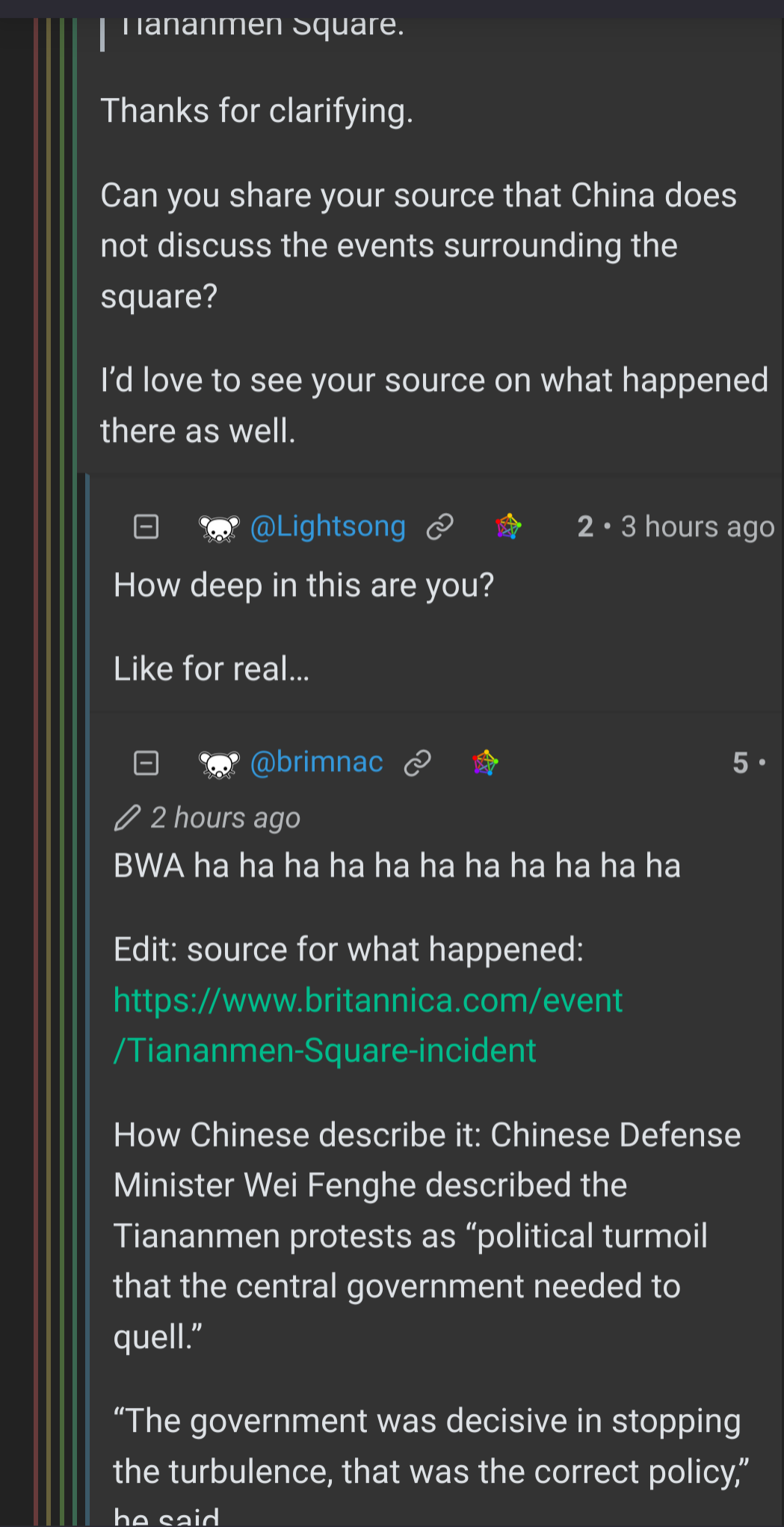My reply is that yes, it was a top-down mistake, government policy was a major factor compounding the famine (the CPC even admits it) and nothing like that has happened in the many decades since, demonstrating the ability of the government and the broader movement to learn from mistakes and avoid repeating them. As some other replies pointed out, their history of regular famines has stopped entirely since the Three Year Great Famine, so they have clearly learned, improved and overcome a major hunger issue in a country with huge food demands.
What about certain square? Will the government ever admit it?
What about certain square? Will the government ever admit it?
Nisour square? I think the U$ is glad it happened.
Tiananmen Square.
Tiananmen Square.
Thanks for clarifying.
Can you share your source that China does not discuss the events surrounding the square?
I’d love to see your source on what happened there as well.
Funny how reddit libs will just downvote this comment asking for sources but not dare engage with it.
It’s an intellectually honest question. Can anyone actually provide a source that China does not discuss the events surrounding the square? Or do they just assume it’s true and have never actually looked to confirm that claim themselves?
Since they’re banned we can’t see the comments from inside the 'grad (and they can’t see yours since you’re apparently banned from .world). He edited in an encyclopedia article, with no sources:

Funny how they come out in droves to downvote in general. Always good for a laugh. They sometimes downvote the most neutral comments as well. Makes me wonder if they have a mccarthyite list of “known communists” or something and are instructed to downvote on sight.
BWA ha ha ha ha ha ha ha ha ha ha ha
You’re right, it’s pretty funny to see you get banned
BWA ha ha ha ha ha ha ha ha ha ha ha.
Fuck off, cracker
* You got banned so I can’t respond to your comment asking for a source. It’s pretty funny, though. My source is that you typed “bwahaha”
@brimnac, since you’re banned from the 'grad (good), I can’t interact with you. I can see your responses if I dip into lemmy.world.
An encyclopedia article is not a primary source.
An encyclopedia article without any actual links to sources or references may as well be a work of fiction.
That’s not a fucking source and you’re still a cracker.
i’D lOvE tO SeE yOuR sOUrCe sTaTInG i’M a CrAcKeR.
Yeah, but it was the last famine china has had. With over 1800 recorded.
All you should need to say is there were famines every couple of years before the communists came to power. After they came to power there was a single famine. There were no more famines after that. If communists really wanted to cause famines wouldn’t they have allowed/forced even more afterwards? They didn’t, and the lack of famines also showed that socialism eliminated famines. And now they’ve eliminated poverty striking a strong blow to general food insecurity too.
If the Chinese government should be fully responsible for starving millions, then it would be no less logical to give it credit for saving millions, too:
During the Difficult Three Year Period the state also expended large amounts of money and materials carrying out famine relief in the heavily stricken areas. Spending on relief funds was increased, the basic food supply for disaster victims was guaranteed, large teams of medical care workers were sent to provide medical aid in the disaster-stricken areas, and so forth. With mobilization and direction from the CPC and the state, the entire nation fought together against droughts, floods, locust plagues and other natural disasters, using a variety of production and self-rescue activities.
(Source.)
Mention the wording of “affecting millions” does not equal “killing millions” as a starting point
Despite the damage and death caused to humanity and the sad extinction of multiple bird species, Mao didn’t come up with the sparrow campaign out of nowhere. Scientists genuinely believed they were a disease/parasite vector. Its no different from how countries today cull populations of pest species, inoculate animals that spread disease, and control animal populations during disease and hunting seasons.
I always say that for those in a position of power, its better to do something than to do nothing. Mao and the scientific community didn’t have the full picture and couldn’t see the extent of all the potential consequences, the goals were good, and the communist party and scientific community took steps to mitigate and learn from mistakes.
Neoliberals Getting mad at Mao for allegedly killing millions (which Monthly Review expresses serious doubt over) and blaming communism and mao is like getting mad at early humans burning themselves to death when they first tried to use fire to cook food or keep themselves warm.
Fascist Authoritarianism is a form of government and communism is an economic system, communism has been used as a carrot dangle by corrupt fascist authoritarian governments many times but has nothing to do with communism itself, and even so fascist capitalism has caused way more far reaching harm than fascist communism has
Fascist Authoritarianism is a form of government and communism is an economic system, communism has been used as a carrot dangle by corrupt fascist authoritarian governments many times but has nothing to do with communism itself, and even so fascist capitalism has caused way more far reaching harm than fascist communism has.
Can you define “authoritarian” as you use it here?
Also, what the fuck are you even trying to say here?
It’s the authoritarianism that makes these governments bad, not the type of economic system.
You need to ensure a good democracy, regardless of economic policy.
It’s the authoritarianism that makes these governments bad, not the type of economic system.
You need to ensure a good democracy, regardless of economic policy.
Alright, thanks for helping me understand your argument.
What do you mean by authoritarian?
The opposite of democratic. It’s a gradient. The people of a nation either has equal influence on how the nation is run, you have something in between or a very small minority has all the power.
The extreme where everyone have equal influence (impossible in reality) is perfect democracy. The extreme where a single person has all the influence, is an perfect authoritarian. Then you draw rough lines at points where the democracy is as good as you can possibly get, a flawed democracy, authoritarianism light, etc, depending on how unequal the influence is between people.
Also, I am not the one who you originally replied to.
The opposite of democratic. It’s a gradient. The people of a nation either has equal influence on how the nation is run, you have something in between or a very small minority has all the power.
Where are you getting this definition from? It doesn’t match what I’ve seen.
The extreme where everyone have equal influence (impossible in reality) is perfect democracy. The extreme where a single person has all the influence, is an perfect authoritarian. Then you draw rough lines at points where the democracy is as good as you can possibly get, a flawed democracy, authoritarianism light, etc, depending on how unequal the influence is between people.
I’m not clear on how you’re determining which flawed political project is “as good as you can possibly get”. Is there some non-authoritarian political project you support? If not, is there a level of authoritarianism you find acceptable?
You are trying to be way too specific in your counter questions for it to ever be meaningful. A better question would be, why isn’t it possible to get a perfect democracy.
The answer is simple, if you have any influence over another person, it’s already not perfect. As in a well spoken person at any workplace can voice their support for certain policies and create a higher influence for some stated ideas than a person being silent.
Your final question does not make sense. The point is to try to find more and more democratic systems regardless of initial conditions. Forced transparency for people in power for example increases democracy, nice, then we do it.
I have not stated any specifics on what constitutes what to what degree, I only defined the entire solution space. So it’s no wonder it’s not clear.
You are trying to be way too specific in your counter questions for it to ever be meaningful. A better question would be, why isn’t it possible to get a perfect democracy.
I’m trying to use the specific questions as a rhetorical device, so that you can’t avoid defending your position with a vague out like this:
I have not stated any specifics on what constitutes what to what degree, I only defined the entire solution space. So it’s no wonder it’s not clear.
Your final question does not make sense. The point is to try to find more and more democratic systems regardless of initial conditions. Forced transparency for people in power for example increases democracy, nice, then we do.
I’m trying to get you to argue for the political system you support. I’m frankly not very clear on your explanation of an authoritarian gradient, but it’s very common for “anti-authoritarians” to support a wide range of things that are very authoritarian.
I’d like to highlight one bit you said:
The point is to try to find more and more democratic systems regardless of initial conditions.
This is basically the goal of the political philosophy of Marxism-leninism. Like, idk if we have much to argue about if that’s your goal.
deleted by creator







